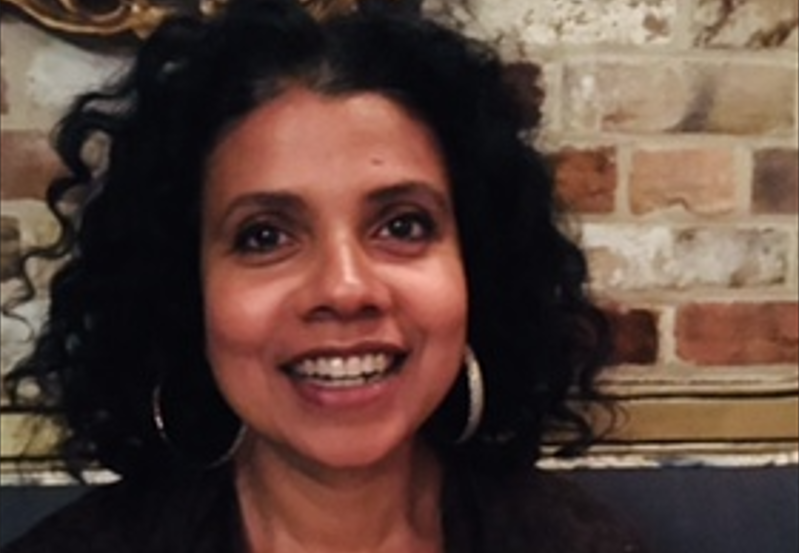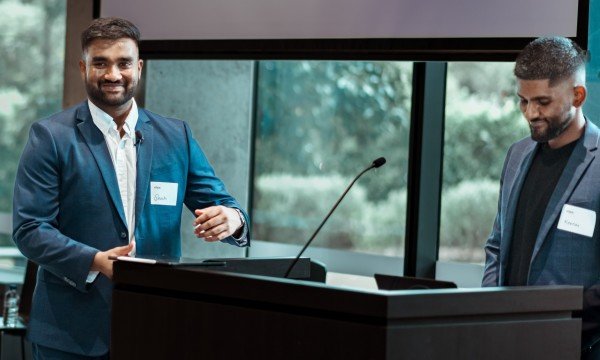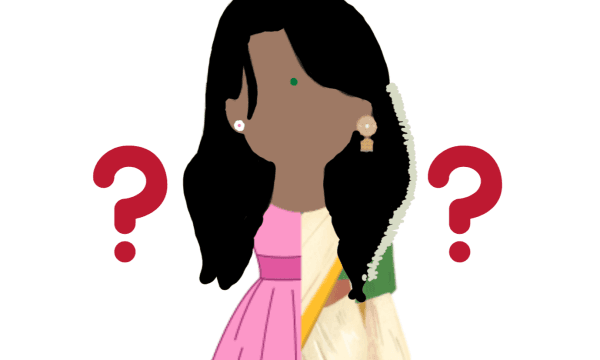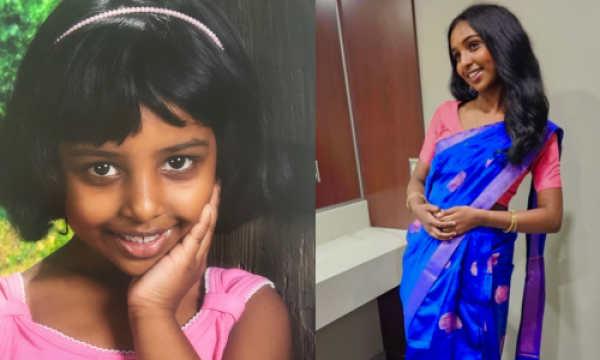
___
***Are you or someone you know in the global Tamil community doing great things? We'd love to feature them: FILL OUT THIS FORM ***
Network & collaborate with Tamil Changemakers from around the world. Request to join our private LinkedIn community here.
___
How did you think your childhood, or your formative teenage years play a part in you developing a passion for community building & the arts?
I think I was happiest as a child when I was involved in the arts in some form: singing in the church choir, doing theatre, or watching movies. Colombo is a very ethnically and religiously diverse place, so we were all engaged in each other’s celebrations, festivals and food. But at that time, especially after the riots, most Tamil girls lived very cloistered lives. So, these arts events were the only social events I went to apart from family gatherings. On the other hand, my dad liked to travel, and being exposed to the arts in other countries helped me develop a comparative understanding of cultures, and that was exciting and formative for me as well. Art is a mediating force to help us navigate through complex issues and negotiate difficult conversations that we might not otherwise be able to have, so the arts play a large role in any kind of community building I do.
I was a very shy, introverted child though. I could not have predicted that I’d be involved in community building in any direct way.
How did experiencing the war in Sri Lanka impact the decisions you made when you came to Canada?
I felt very disempowered when I came to Canada and found myself confronting an entirely different set of prejudices. I had very little decision-making power as a young woman living with my newly immigrated family. It was only when I moved out on my own, and had the social supports to do that here, that I found I could make decisions for myself. I was determined to go to university here, something I could not have safely done in Sri Lanka. I think the war has scarred us in ways we may still not have processed; it certainly took a long time for me to stop being fearful.
What made you decide to pursue a PhD and create the Tamil Studies Symposium at York University?
I started on my PhD because I wanted to think through my own condition – I’m a person who needs to intellectualize things to be at peace with myself. I wanted to think through how political refugees come to feel disempowered as they enter a place that is supposed to be a safe haven for them. It seemed that they were losing something in the process, and I wanted to figure out how and what that was.
I created the Tamil Studies Symposium because York University, which has the highest Tamil student population in the country, has very few resources and no Tamil faculty to advise undergraduates or graduate students on projects they might want to do related to their own culture and identity. Without any Tamil Studies courses or program to bring them together, they were isolated in their work. The Symposium became a way to create a network of young academics to engage with each other’s work and be exposed to seasoned researchers who could act as their mentors. The Symposium also brings artists, academics and community members together so that we can see the vital ways in which our work affects each other’s. It grew into an international thing because there are tons of diasporic Tamil youth who feel disempowered in academic spaces, and they see this as a space where they can speak freely and explore ideas on their shared experiences away from the Eurocentric gaze.

You are described as a “published poet, translator and academic; organizer of community workshops; and curator of cultural events.” How do all the different things you’re passionate about and work on, feedback into one another (if at all)?
I’ve curated the "Tam Fam Lit Jam" for a few years now and done writing and poetry workshops because I’m passionate about the variety of voices that are ignored in the mainstream. When I first ventured into the downtown poetry scene, I was often the only non-white person in those spaces, and while many welcomed me and treated me well, these were not safe spaces. I used to love going to Desh Pardesh back in the day because it was a great space to be surrounded by a sea of very diverse brown people. I try to recreate the positive aspects of those spaces in the work I do as a curator.
Translation naturally falls into that work as well, because I feel the need to bridge some of the generational gaps in our community by bringing the literature to a younger generation that wouldn’t have access to them otherwise. I know it sounds like I do several different things, but it all comes down to community, education and culture. These are things I care about, and am happy to put my energy into, because I find them fulfilling, and I see the benefits they bring.
You are quite involved in the Tamil Community Centre. How did you get involved in that initiative, what is your role and why are you excited about it?
I was invited by some respected community members to join the steering committee and am now on the Board of Directors of the Tamil Community Centre. My role has been mainly around research, grant writing and community consultation, but we are a volunteer committee, so we all wear different hats at different times.
I’m excited about this project because I know how hard the community has worked in the past to get us here, and the dream is finally within reach. It’s a way for Tamils to give back to the communities around us, but also to have a space where we can be unapologetically Tamil. I remember the days when we couldn’t get a space to hold our events, and to know that there’s a space we can all count on is thrilling to me. I look forward to being able to streamline vital services to the community here, and for the community to be able to host cultural, networking and educational events here. We’re also a very hospitable people, so I look forward to welcoming all other communities into this space as well.
Most opportunities are found through informal networks via networking. Even though people know this, I find that a lot of people don’t invest time building up their network. Why do you think this is? What is your definition of networking and how do you go about doing this?
From my own experiences, I’d say that many people in our community who dealt directly with the trauma of war tended to be insular as a form of self-preservation. They build incidental networks because someone always knows a Tamil guy who does a job that needs doing and they’ll reach out to them because they feel more comfortable hiring a Tamil person.
However, a lot of people of my generation (and I think this is truer for women) are quite overcommitted and don’t have time to invest in building their networks.
I organize workshops and art events as my form of networking; we bring people together with shared interests, and they often end up mentoring each other or collaborating with each other. I’m constantly amazed by the generosity of the younger generation in how much they are willing to collaborate and share the glory with each other. It gives me life!
_____________________________
Related Articles:
- The Tamil Creator Podcast (EP #73): Tia Bhuva - Founder Of Successful E-Commerce Brand (TiaBhuva.com) & Creator Of The "Saree Silhouette"
- The Tamil Creator Podcast (EP #72): Bhi Bhiman - St. Louis Native & Musician On His Journey Including New Album "I'll Sleep When I'm Famous"
- The Tamil Creator Podcast (EP #71): Tanya Selvaratnam - Emmy-Nominated Producer, Writer, Abuse Survivor & Social Justice Champion
- The Tamil Creator Podcast (EP #70): Prakash Chandran - Co-Founder & CEO of Xano, Fastest No Code Backend Development Platform
- The Tamil Creator Podcast (EP #69): Apiramy Jeyarajah - Creating & Embracing Change As The Head of UK Wholesale At Aviva Investors
- The Tamil Creator Podcast (EP #68): Tharshan Rajendiram - Co-Creator Of The "Basement Reels" YouTube Channel (80,000+ Subscribers)
- The Tamil Creator Podcast (EP #67): Rathika Sitsabaiesan - From Politician (Canada's 1st Tamil MP) to Professor
- The Tamil Creator Podcast (EP #66): Dunstan Peter - On Launching Trinity Tech, A Multi-Million Dollar Business
- The Tamil Creator Podcast (EP #65): Rubi Balasingam - Kung Fu Trained Australian Actress & Writer Promoting Tamil Voices In TV & Film
- "These Tamil Entrepreneurs Share How They Grew Their Side Hustles"
_____________________________
What’s been a failure (or “learning lesson”) you’ve experienced in the last 3-5 years and what did you learn from it?
I think I was very vulnerable to being exploited because I learned a lot of social skills rather late in life – another side-effect of growing up during a war and curfews. I have learned to be more selective with whom I collaborate, and to not give away my time and energy indiscriminately.
Where do you see yourself in the next 3 years?
I’ve got a few more translation publications forthcoming, and I see myself focusing more on my academic and arts work.
What role has your family & friends played in the choices that you’ve made in your life so far?
Our families shape so much of us without our even realizing it. I think I got my love of reading from my mother and my love of music and film from my father. My siblings and I are all Trekkies, so a lot of conversations on ethics and intercultural conflict were mediated for us through Star Trek episodes, I think. Both sets of grandparents were very community minded; my maternal grandfather used to be head of the Panchayat in our ancestral village. So, growing up with this influence of arts, ethics, conflict resolution and community-consciousness through my family has shaped me in seeking out ways to be useful to my community.
My family supported my desire for a university education, though I don’t think they foresaw that I would go down this particular path. I’m sure they would have much preferred me to be a doctor or a teacher and leading a quiet married life. My partner grew up in a family with strong community values, and we enjoy similar things, so he supports my work as a public intellectual. My close friends are a constant source of inspiration for me, and they affirm the work I do and cheer me on even when my choices don’t follow conventional paths.
What do you do outside of work for fun?
My default is reading mysteries right now, but with the pandemic easing off I hope to get back to swimming. The most fun thing I do is hanging out with my son in nature; his curiosity and joy are the best stress relief for me.
What is an insecurity you have?
That no one will read my work. I am tearing up right now thinking about it.
In terms of your personal legacy, in a few sentences, describe how you want to be remembered by your family and friends?
I hope my family and friends remember me with love as someone who brought beauty and peace into their lives, and a bit of drama – okay, maybe a lot of drama. I hope to leave a body of work and enriching spaces for the next generations to use, knowing that I trust them to do their own thing. I also want, in part, to be forgotten. I think that one of the best gifts you can pass on to the future is to not have the young burdened by dreams that have grown stale. Let them dream their own dreams.
What do you think you would tell 16-year Nedra looking back?
16-year-old Nedra felt very powerless and afraid. I’d tell her that she would find her tribe one day, and the loneliness she felt then was only going to teach her to value them more. I’d also tell her to save herself some time and grief and not let men take credit for her work.
What is your favourite book(s) you’ve read recently and why?
I’m really enjoying the interdisciplinarity of A. K. Ramanujan’s collected essays right now. I like thinking through Tamil sensibilities and how they tie into ecologies, folklore and literary works, and Ramanujan does all that in very beautiful language. I’ve also been slowly working through Leanne Betasamosake Simpson’s Islands of Decolonial Love, which is a painful and profound work. It’s been helping me think through how I can take on decolonial practice in my own work. Don Mee Choi’s Translation is a Mode = Translation is an Anti-neocolonial Mode has also been helping me re-examine my translation practice.
What is a new belief, behaviour or habit that has most improved your life?
I’m perfectionist, which means that I often hold myself back from doing things if I can’t do them exactly right. Leonard Cohen’s song Anthem, where he says: ‘there’s a crack in everything, that’s how the light gets in,’ has become my mantra. I’ve come to accept that I’m flawed and while perfection is something I must always strive for, it can’t become an alibi for apathy.
What is something that you've splurged on recently in the last year that you have zero regret about?
I tend to splurge more on experiences than on things (unless you count books) so I’m much more likely to splurge on traveling or dining out. Absolutely zero regrets about those.
How has the Toronto Tamil community impacted you both personally and professionally?
Working with the community has brought me some of the most meaningful relationships in my life right now. I’ve learned a lot from our elders, like the late Prof. Chelva Kanaganayagam and the activist Mr. Alexander, about how to treat the next generation with dignity and compassion. I’ve learned a lot from working on the Community Centre project, the Symposium and the Tam Fam Lit Jam, where it’s always been my community showing up for me and helping me. I’m especially grateful for the young queer folx who have taken risks with me and shown me what real care looks like.
I could do without the misogynists and the egotists who need to dominate every field and every conversation, but every community has that. I’ve learned to turn away from those folks. Even though on paper it may appear that we have overlapping values, I’m surprised to discover that the idea of a woman being an intellectual still doesn’t sit well with them. Instead, I’ve found myself collaborating with folks I don’t always agree with, but who have integrity and community goodwill. I’ve found that they are more likely to help me professionally and credit me for the work I do. I’m learning to keep an open mind.
What is your favourite Tamil food (meal or dessert)?
My favourite Tamil food is koottanchoru: it’s a mix of vegetables and rice, sometimes with a bit of fried dry fish in it. It tastes a lot like sambar mixed in with rice.
What is your favourite Tamil movie?
There’s no short answer to this because film is one of my passions. I love a lot of the old classic Tamil films with Sivaji Ganesan and MGR – talk about guilty pleasures. Thanneer Thanneer is an old film that has stayed with me as an example of what social cinema could be. Recently I’ve been struck by Arun Karthick’s Nasir, Leena Manimekalai’s Maadathy and Ranjith Joseph’s Sinamkol. They portray oppressed people with so much dignity and care. These are not films made for the white male gaze; they aim for internal conversations in nuanced ways. I’m also intrigued by our young diasporic Tamil filmmakers making films in English and French – I consistently follow the work of Pras Lingam, Kalainithan Kalaichelvan, Miru Yogarajah, Maya Bastian and Maria Saroja Ponnambalam. They try to work through the impact of the political on the everyday in very thoughtful and compassionate ways, and they are deeply invested in community conversations. I learn about what film can accomplish as a medium by watching these independent filmmakers much more than through the mainstream.
What does Tamil culture mean to you?
Tamil culture can mean different things to different people, and I’d rather think about Tamilness: what intrinsically makes us Tamil. Our love for the natural world – it’s in everything from our folk songs and literature to film. Our generosity – the way people who have very little will share their meal with you. The kind of blindly loyal, all-consuming way in which we love our friends and family. The over-emotional way in which people fight and make up and become stronger friends. The way the best of us will always try to take the community along when they achieve something. Our cleverness, our hustle, our ridiculously competitive drive and our endless curiosity. Tamil people are the most curious people I know – we always want to know how things work. It’s how we inhabit the world. It’s how I know we’ll survive: if there’s a way to be found, we’ll find it.
**Looking to create your love story? Join the other couples who have dated and married through myTamilDate.com!***
"myTamilDate Success Story: It Was Love At First Sight For Madhu & Niya"
"myTamilDate Love Story: Jenani & Nav Found Each Other At The Right Time And Right Place In Life"
"myTamilDate.com Love Story: Tharshi & Ravi Found Love During Lockdown"
"How France Met Canada: A MyTamilDate.com Love Story"
***CLICK HERE to listen to us on Spotify!***
Related Articles:
- Tamil Innovators: Thanuska Subramaniam on Finding Success in the Creator Economy
- Tamil Innovators: Prajeeth Balasubramaniam Discusses Startups & Investing in Sri Lanka
- Tamil Innovators Spotlight: Nivatha Balendra On Surviving Cancer & Building a CleanTech Startup
- Separated From Family During Sri Lanka's Civil War, Ganesh Thava Overcomes Childhood Adversities To Find Success As Actor, Writer & Director
- Singaporean-Born, Canadian-Raised, Decolonial Racial Equity Educator Channdika Thayver Delivers Powerful TEDx Talk On Racial Equity In The Workplace
- "Tamil Innovators Spotlight: Theban Ganesh Discusses Building a Web3 Company, Improving Healthcare Through Blockchain, Successful Exits"
- "Karthy Subramaniam Co-founded Fast Growing Sauce Company LITS as a Tribute to a Childhood Friend"
- "Elite Athlete, Coach, Future Chiropractor & Entrepreneur Abirami Shanmugaratnam Is Making Waves In The Athletic Performance Industry"
- "Toronto's OG Food Writer Suresh Doss Is Using His Reach And Voice To Help Engineer A Comeback For Beleaguered Restaurant Industry"
- "Ballet And Kung Fu Trained Australian Actress & Writer Rubi Balasingam Is Promoting Tamil Voices In Aussie TV And Film"
- "Yathusha Kulenthiran's Marketplace For Environmentally Sustainable Palmyra Products Empowers Female Artisans In Sri Lanka"
- "Australian-Tamil Entrepreneur Sujan Selven Is Creating Economic Opportunities For Remote Villages In Northeast Sri Lanka Using Upcycled Devices & Improved Connectivity"
- "Crypto Tinhorn & Former Journalist Anand Venkateswaran Talks About Buying A $69M Digital Art Piece, Collecting Stories & Catalyzing Change"
- "Tamil Innovators Spotlight: Abarna Raj, CEO of Australian Social Startup Palmera, Is Tackling World Poverty"
- "Tamil Innovators Spotlight: Tea Drops CEO & Founder, Sashee Chandran"
- "Tamil Innovators Spotlight: Knowledgehook's CEO, Travis Ratnam"
- "Danny Sriskandarajah's Journey From Rural Sri Lanka to CEO of Oxfam Great Britain"
- "The NBA Bubble: Dr. Priya Sampathkumar Helped Make It Happen"
- "These Tamil Founders Behind Agritech Startup Dunya Habitats Want To Alleviate Food Security Globally"
- "Angel Investor Jay Vasantharajah On Building His Portfolio One Day At A Time"
- "Breaking Into Hollywood: Meet Tamil-Canadian Actor Vas Saranga"
- "Meet Rebecca Dharmapalan - Filmmaker, Legal Scholar, And Activist"

























